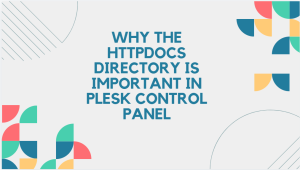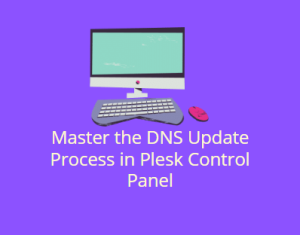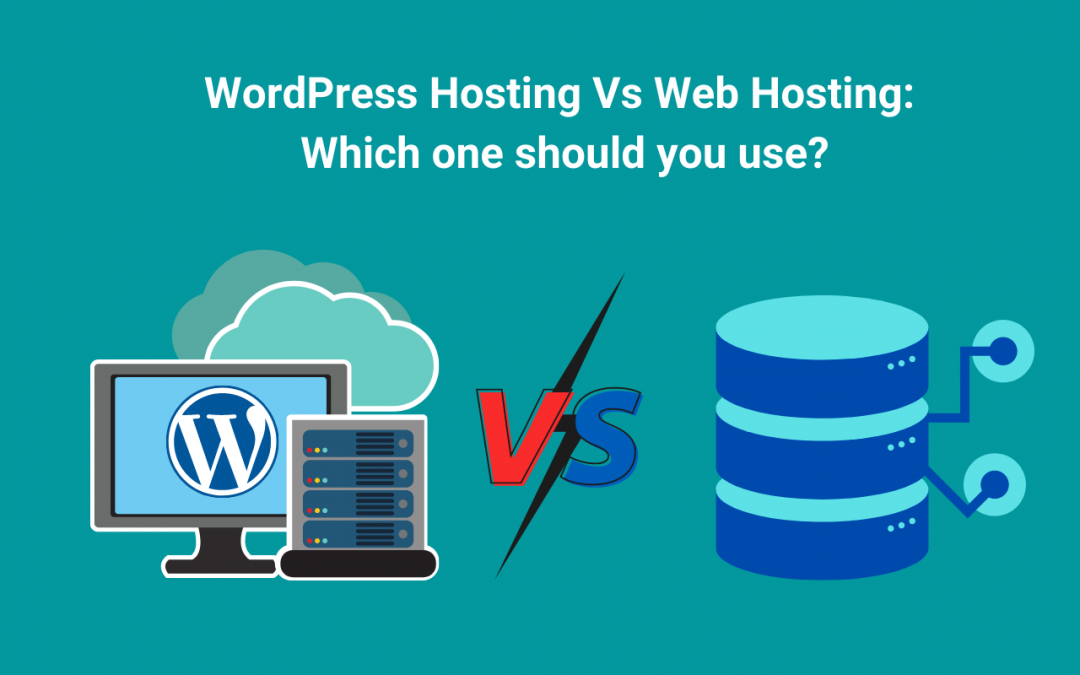
Web hosting and WordPress hosting are related but distinct services, each catering to different needs and preferences. When it comes to hosting a website, there are many factors to consider. An important decision you’ll make is choosing whether to use WordPress hosting or web hosting.
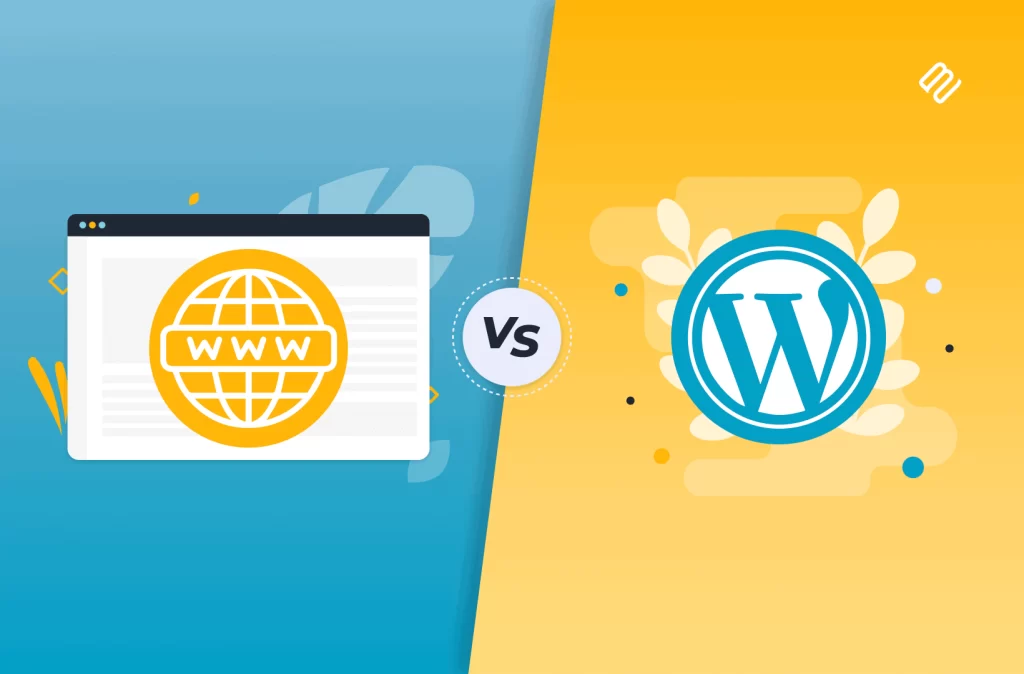
While both types of hosting will get your website up and running, there are some key differences that you should be aware of before making a decision. In this article, we will discuss the differences between WordPress hosting and web hosting so that you can make an informed decision about which type of hosting is right for you.
Table of Contents
What is Web Hosting Services
A web hosting service furnishes the necessary infrastructure and resources to sustain the functionality of a website. Upon subscribing to a web hosting service, you gain entry to a web server, storage space for your website’s files, and fundamental features like email accounts and domain names. Additionally, many web hosting providers extend supplementary features such as security tools and traffic analytics.
At its core, web hosting involves the provision of servers by a service provider for customers to store their website files, encompassing HTML pages, images, videos, and various media formats. Once these website files find a home on the server of a web host, they become accessible to anyone with an internet connection.

Various types of web hosting services cater to different needs. Shared hosting, the most popular and cost-effective option, entails storing your website alongside others on the same server. Cloud hosting, a more modern alternative, delivers heightened flexibility and scalability by storing your website on multiple servers. This redundancy ensures continued accessibility even if one server experiences downtime. Virtual Private Server (VPS) hosting offers more resources than shared hosting but comes at a higher cost, making it suitable for websites outgrowing shared hosting but not requiring the resources of a dedicated server. Dedicated servers, the priciest option, allocate customers their physical server, exclusively dedicated to their use and not shared with others.
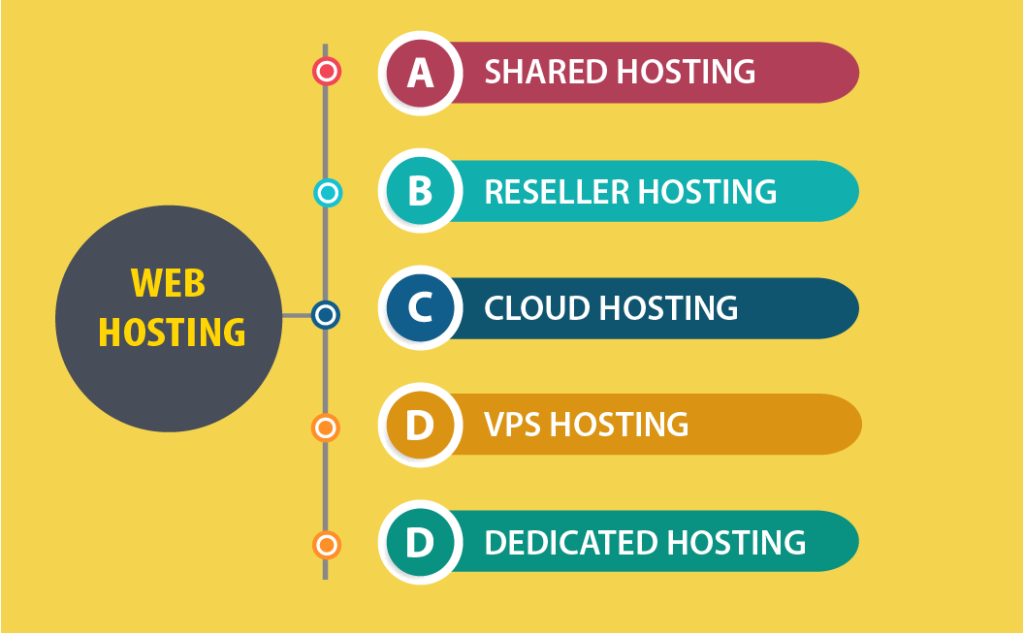
What is WordPress hosting services
A WordPress hosting provider specializes in hosting websites built on the WordPress platform, which is renowned as one of the most widely used content management systems (CMS) globally, powering millions of websites.
If your intention is to launch a WordPress website, opting for a WordPress-specific hosting service is essential. These services encompass all the features provided by conventional web hosts and go a step further by offering additional features tailored specifically for WordPress websites. Examples include automatic updates, enhanced security measures, and pre-installed themes and plugins.

Given their exclusive focus on WordPress, these hosting services are often more user-friendly compared to traditional web hosts. However, it’s worth noting that they can be relatively costly, particularly if you opt for a premium plan with advanced features. For those on a budget, an alternative is to consider a traditional web host and manually install WordPress. While this approach may require more initial effort, it can be a cost-effective choice in the long run.
Advantages of web hosting
Web hosting offers several advantages that are crucial for individuals and businesses looking to establish an online presence. Here are some key advantages of web hosting:
- Server Resources: Web hosting provides access to server resources, including storage space, computing power, and bandwidth. This allows you to store and serve your website files, ensuring they are accessible to users on the internet.
- Reliability and Uptime: Reputable web hosting providers strive to offer high levels of reliability and uptime. This ensures that your website is consistently accessible to visitors without experiencing frequent downtime.
- Technical Support: Web hosting companies typically provide technical support to assist with any issues or questions related to server management, configuration, and other hosting-related concerns. This support can be valuable for users with varying levels of technical expertise.
- Domain Name and Email: Many web hosting packages include domain registration services, allowing you to secure a unique web address (domain name) for your site. Additionally, hosting plans often include email services, enabling you to create professional email addresses associated with your domain.
- Security Measures: Reputable web hosts implement security measures to protect websites from common threats, such as malware, hacking attempts, and data breaches. Regular security updates and monitoring help maintain the integrity of hosted websites.
- Scalability: As your website grows, you may need additional resources to handle increased traffic and data. Web hosting plans often offer scalability, allowing you to upgrade your hosting package to accommodate the growing needs of your website.
- Backup Services: Many web hosting providers offer automated backup services, ensuring that your website data is regularly backed up. This feature is essential for data recovery in case of accidental data loss or website issues.
- Control and Customization: With web hosting, you have greater control over server settings and configurations. This allows you to customize your hosting environment based on your specific requirements, whether you’re hosting a simple blog or a complex web application.
- Cost-Effectiveness: Web hosting services are available at various price points, making it a cost-effective solution for individuals and businesses of different sizes. Shared hosting, in particular, is often an affordable option for those starting with smaller websites
Advantages of WordPress hosting
WordPress hosting offers several advantages specifically tailored to the needs of WordPress websites. Here are some key advantages of using WordPress hosting:
- Optimized Performance: WordPress hosting is configured and optimized to provide better performance for WordPress websites. This includes server configurations, caching mechanisms, and other optimizations that can contribute to faster loading times.
- Automatic Updates: Many WordPress hosting providers offer automatic updates for the WordPress core, themes, and plugins. This ensures that your website stays up-to-date with the latest features, security patches, and bug fixes without requiring manual intervention.
- Security Enhancements: WordPress hosting services often include enhanced security measures designed specifically for WordPress sites. This can include firewalls, malware scanning, and other security features to protect your website from potential threats.
- Specialized Support: WordPress hosting providers typically have support teams with expertise in WordPress-related issues. This specialized support can be valuable if you encounter problems specific to WordPress, themes, or plugins.
- Pre-installed WordPress: WordPress hosting usually comes with WordPress pre-installed, streamlining the setup process for users. This eliminates the need to manually install WordPress, making it easier for beginners to get started.
- Managed Services: Many WordPress hosting plans are managed, meaning the hosting provider takes care of routine maintenance tasks, backups, and other management aspects. This allows users to focus more on creating content and managing their websites rather than handling technical details.
- Scalability: WordPress hosting plans often provide scalability to accommodate the growth of your WordPress website. As your site expands and attracts more traffic, you can easily upgrade your hosting plan to ensure optimal performance.
- WordPress-specific Features: WordPress hosting services may include additional features specifically designed for WordPress users. These can include one-click staging environments, content delivery network (CDN) integrations, and tools to manage and optimize WordPress databases.
- Built-in Caching: WordPress hosting providers often include built-in caching solutions that can significantly improve the speed and performance of WordPress websites. Caching helps store static versions of your site’s pages, reducing the load on the server.
- Developer-Friendly Tools: Some WordPress hosting plans come with tools and features designed for developers, making it easier to customize and optimize the WordPress environment. This can include easy access to server configurations and developer-friendly staging environments.
Web hosting vs WordPress hosting: Which one is right for you?
Choosing between web hosting and WordPress hosting depends on your specific needs, technical expertise, and the type of website you want to create. Let’s explore the factors to consider for each option:
- Type of Website: If your website is exclusively built on WordPress and you want a streamlined experience, WordPress hosting is a natural choice. For more diverse projects, general web hosting may be more suitable.
- Technical Expertise: If you have technical skills and want more control over server settings, general web hosting might be preferable. If you’re a beginner or prefer a more managed solution, WordPress hosting could be a better fit.
- Budget: WordPress hosting plans may be slightly more expensive than general web hosting, so consider your budget constraints.
In conclusion, choose the hosting type that aligns with your website’s requirements and your comfort level with managing hosting-related tasks. If you’re unsure, many hosting providers offer a variety of plans, and you can always start with a basic plan and upgrade as your website grows.
